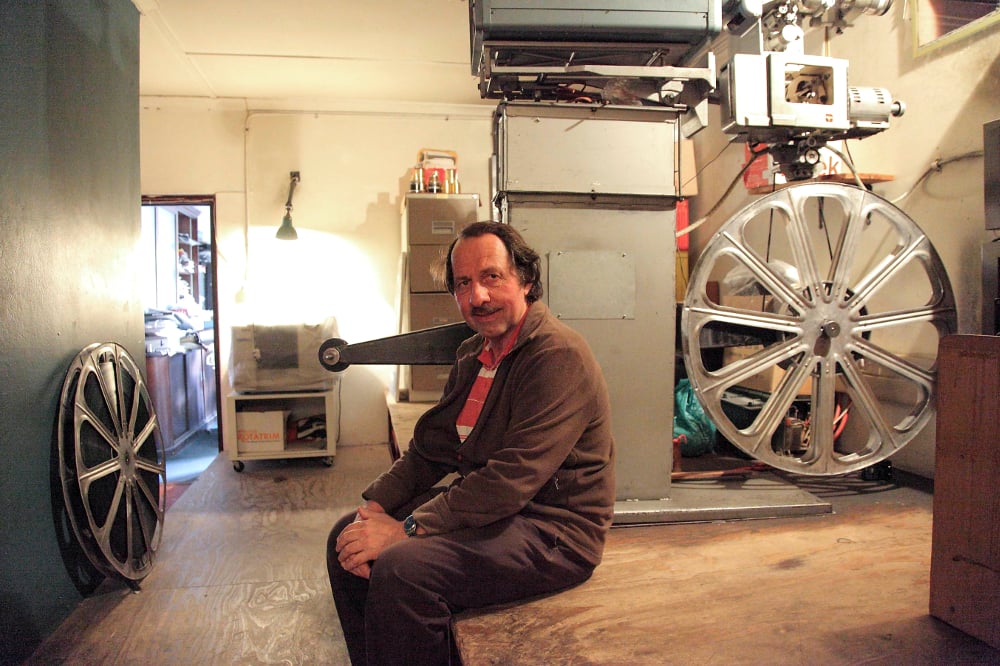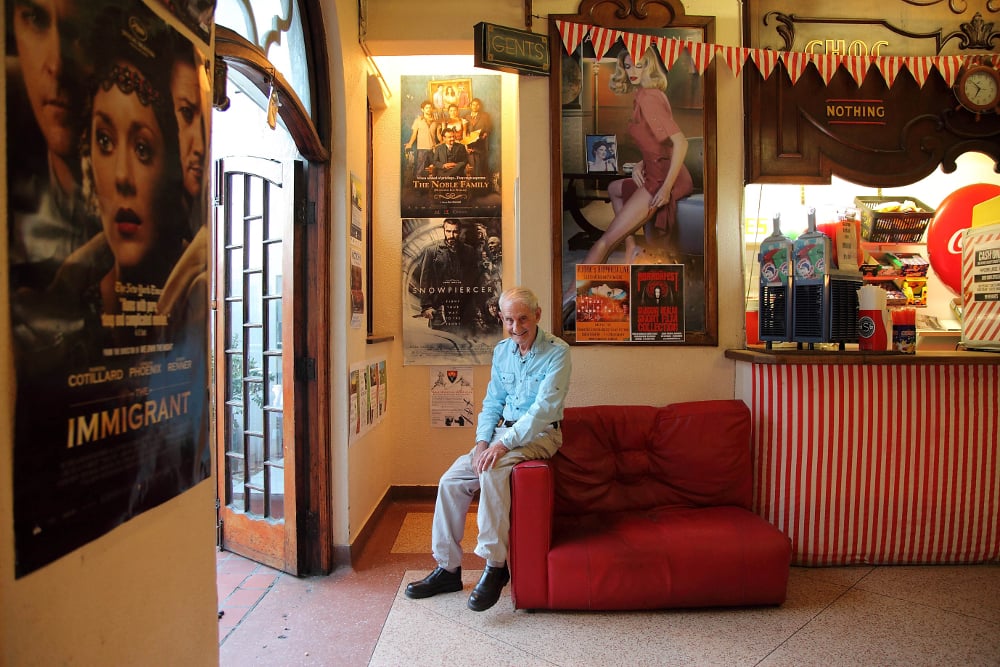Obsessive about movies: Office manager
South Africa’s longest running independent cinema, the Labia Theatre in Cape Town, may be showing its age, but it is keeping up with the digital times. A little like an old lounge singer from The Triplets of Belleville, the cinema seems slightly bedraggled, its outside edges less polished than in its heyday. But it doesn’t matter. Because at 65, the Labia’s unassuming charm is as endearing as ever. Combined with its recent digital conversion – think superior sound and picture quality – as well as a crowdfunding drive that will help to upgrade the interior, the Labia is clearly here to stay.
The struggle is over
Recent rumours about it closing have made way for a new sense of hope as, according to Ludi Kraus, the Labia’s owner for 25 years, more patrons than ever cross its doorstep these days. “It’s the end of a long struggle,” says Kraus, sitting in his office surrounded by piles of paper stacked on a few scattered desks. He looks at the photographs of the Alhambra, his father’s old cinema in Windhoek, hanging on the back wall. It’s where he spent most of his childhood, developing a passion for independent films. “Now digital’s come and opened a whole new world for us.”
A wonderful world, one without bulky reels of film, in which an incredible variety of old and new movies are available on compact hard drives. Kraus smiles. “Imagine a new generation seeing The Last Tango in Paris.” Going digital may have been the Labia’s saving grace, but it didn’t come cheap or easy. “We really had to improvise,” says Kraus. “The Labia’s always made do with second-hand equipment, and it was never built to be a four-screen cinema. In fact, it was a ballroom for many years, before becoming a performing arts theatre in the Sixties.”
Back then, Robert Kirby and other renowned playwrights staged plays at the venue, before screenings of the odd film happened around 1975. The mid to late 1970s was also when independent cinemas organised film festivals to expose South African audiences – victims of heavy censorship – to a global revival of art filmmaking. At these festivals, films by the likes of Federico Fellini and Rainer Werner Fassbinder showed for the first time. When Kraus bought the run-down Labia Theatre in 1989, local independent cinemas such as Johannesburg’s Piccadilly and the Electric Cinema in Durban were thriving.

Ludi Klaus has owned the Labia for 25 years. (Lien Botha)
The projector
But the mid-1990s saw many close, save Durban’s Avalon Group, and, of course, the Labia Theatre, thanks to Kraus, who traded a law career to follow his passion for independent films. After his father sold the Alhambra in 1979, Kraus, who was then practising as a lawyer, missed the cinema, and started importing art films from Europe. He hired the Baxter Theatre in Cape Town and the Nico Malan, as Artscape was known in those days, to screen his movies. “But it was difficult to build a clientele [using nonpermanent venues], so when the Labia was for sale in 1989, I left the law to become a full-time theatre owner.” Kraus then hauled the Alhambra’s old projector out of storage, and it has been a Labia fixture since then.
He laughs: “But some of the staff members have been here for even longer than me and my projector!” Christene Chitter, the head usherette for 33 years, smiles: “Yes, I know it’s a long time.” She looks more like a little cherub, with her oval face and cropped hair, than someone who has been ushering cinemagoers to their seats for decades. She says there are still problems with digital, though. “People sometimes say the sound is too soft. Then I have to run upstairs and sort it out with the projectionist.” And her favourite film? “Cinema Paradiso! It reminds me of Mister Kraus growing up with the cinema.”
More than just a movie
Rose Nhlapo, the Labia’s office manager, receptionist and ticket saleslady for the past 23 years, says watching movies is in her blood. “I’m serious. I’ve grown obsessive over the years,” says Nhlapo, who previously worked for Michael Lazarus, owner of the defunct Pinelands cinema. “I saw The Hundred Foot Journey the other day. I loved it. Especially the Indian family. You know where you stand with them. Just like with Ludi,” she says. “When I came back from maternity leave one day, Michael’s business was closed and he sent me to Ludi. And, as they say, the rest is history!”
Talking about history, Harold Dirneik, who has owned the coffee and sweet shop business at the Labia for 23 years, is an institution at the cinema. With his snowy white hair and black poloneck jersey, he serves drinks and eats from behind the glass counter in a corner, where, he says, decades ago, only an old couch was pushed up against the wall. “People sat there eating takeaway fish and chips for lunch,” he says. A seasoned businessman, Dirneik’s endeavours include owning an Italian restaurant in Sea Point, Il Cappuccino, where he met Kraus before starting his business at the Labia. “It hasn’t been easy, though,” he says, “but things have been turning lately, and it’s been worth the wait.”

Harold Dirneik has owned the coffee and sweet shop at the Labia for 23 years. (Lien Botha)
Dirneik’s eyes light up when asked about his favourite movie: “Oh, without a doubt, I love American Beauty.” He is surrounded by staff who love “Uncle Harold”, as he is fondly referred to. One of them is Clair Idesis, the short, dark-haired manager of his sweet counter and coffee shop business for 20 years, and Sasha Landsman, his girl Friday. Like Idesis, Landsman professes eternal loyalty. “I made a promise to Uncle Harold to work here until death do us part.” Once she brought her children to see her favourite movie, Mandela, Long Walk to Freedom. “It really got to me.”
A film that got to Peter May, a Labia projectionist for 18 years, is Tea with Mussolini. “Those women were up to all kinds of mischief,” he says with a smile. Although May, who often helps film students with their projects, is all for going digital, he believes it could easily make projectionists lazy. “Old films used to arrive in parts, and we had to put it all together. You could even build a bit of muscle with all the lifting up and down!” Sedick Tassiem, who hails from District Six and sports a waistcoat, bright scarf and jaunty hat, has been a Labia usher for five years and is also an unsung music hero. “Once I was part of the Kaapse Klopse [Cape Carnival].” He counts on his fingers: “I can play the violin, mandolin, piano, organ, drums, trumpet, clarinet. Anything. You name it. In Germany, I won first prize for a solo. I sang Cliff Richard’s How Wonderful to Know, in Afrikaans. It sounded like this,” and he starts: “Kom terug na my, my liefde vir jou …” Tassiem goes old school with his favourite movie choice: High Noon.
Finding inspiration in the new film Boyhood rather that the classics is Cedric Michaels, a projectionist for 14 years. “I love how it shows the different stages of growing up.” The Labia is like family to him, especially Riedwaan Fridie, another projectionist, who has been at the Labia for 33 years. “I was an usher first before Riedwaan taught me the old ways of projecting,” says Michaels. “Now with digital films, you just load, and press the button, switch on the lamp and check the volume. Then it’s show time!”